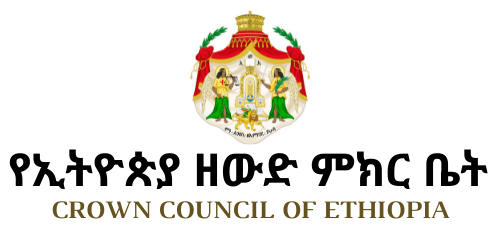Ethiopia’s unity and very survival as a nation-state was being challenged today more than at any time for many centuries, according to the Christmas Message of the President of the Ethiopian Crown Council, His Imperial Highness Prince Ermias Sahle-Selassie Haile-Selassie. “The dismemberment of Ethiopia would be a disaster not only for Ethiopians but for the entire world,” the representative of the Ethiopian Monarchy said today in his seasonal message of goodwill to Ethiopians inside the country and in the diaspora.
Speaking from Washington DC, where the Ethiopian Crown is currently in exile, Prince Ermias said that, despite the dangers, there were signs of hope that Ethiopians were taking the initiative to restore the unity and traditional symbols of their country in the face of enormous foreign pressure and intervention. Ethiopia’s Solomonic dynasty, which traces its origins back to the union of Israel’s King Solomon and the Queen of Sheba, is the oldest leadership institution in the world today, extending back some 3,000 years.
Prince Ermias’s brief Christmas Message said:
“To all Ethiopians, inside our homeland and to those Ethiopians scattered in a diaspora to a hundred more countries around the world, the Crown of Ethiopia sends Greetings at this sacred time of the year, and hope and encouragement for the coming months as our country faces its most severe threats for many centuries to its unity and very survival.
“As we approach the date of the Orthodox Christmas and in the midst of Ramadan, already being celebrated by Ethiopian Muslims, we bring you a message of hope and support. Ethiopia is under assault from many forces, internal and external, and there are those radicals in the Sudan who have threatened to embark on a campaign to dismember our country, and break it up into a patchwork of insignificant states. The threat from Islamist radicals in Sudan comes in defiance of the Order of the Prophet Mohammed that Ethiopia should not be attacked. And yet this threat, and the threats to unity posed by those within our country, and from the military attacks on our borders by Eritrea, has only served as a final warning to all Ethiopians that our way of life, our institutions and our very history are under assault.
“As a result, we have as a people and as a union of peoples begun to rally. The Ethiopian Crown has, since the torch was passed to the Crown Council by His late Majesty Emperor Amha Selassie I in January 1997, begun to once again provide this rallying point for Ethiopia, a unifying symbol for all of its citizens and, we hope, all of its political parties and movements. This has come not a moment too soon. The break-up of Ethiopia would mean the impoverishment of Ethiopians, who would lose their economic and political viability. It would mean the loss of a culture which, with unbroken continuity, represents the longest-span of human civilization.
“Ethiopia is a cultural treasure of the entire world. But it is also a vital strategic bulwark, ensuring the stability of the flow of the waters of the Nile, so vital to the economic and social security of Sudan and Egypt, and also directly to the future of the Palestinean-Israeli peace. Ethiopia is vital to the security of the Horn of Africa, and therefore the security of the Red Sea and Suez Canal sea lanes. This, then, bears directly on the stability of global trade and also on the stability of the oil-producing states of the Arabian Peninsula.
“Today, Ethiopians and Eritreans ponder their ongoing border dispute. But many of the threats which face Ethiopia also face Eritrea, and it is vital that we find an early end to this family dispute before the external pressures hurt both our peoples. Ultimately, geography dictates that Eritreans and Ethiopians must live together, and it is important that — regardless of our disagreements — we be able to face the external threats together.
“Within Ethiopia, we have seen the start of some measure of healing. The release from political captivity in Addis Ababa of Professor Asrat Woldeyes, the founder of the All-Amhara Peoples’ Organization, last week was a victory, an overdue victory, for the collective action of Ethiopians who have demanded that national leaders respect the voices of a free people. We acknowledge that this step, brought about by more than five years of pressure from Ethiopians and foreign governments, is truly a first step in a process which could lead to a healing of the divisions inflicted upon our society beginning when the Dergue seized power illegally in 1974. We should acknowledge that the release was to enable Dr Asrat to receive medical treatment; it did not lift the charges against him. Nonetheless, it was a move in the right direction.
“We thank the Ethiopian community for helping to bring this about. We also thank most profoundly the Governments of the United States and Britain, among others, for continuing to press for Dr Asrat’s release. But should also be aware that Dr Asrat, a man of medicine, teaching and tolerance — a man opposed to violence as a political tool — remains in poor health as a result of his confinement and lack of medical attention. His illness and his detention serve as a condemnation of the lack of tolerance which, during the past eight years, have divided our country when it could have been healing and uniting. And should Dr Asrat suffer further, or die, as a result of his confinement, then it would remain a permanent and possibly irreversible blight on the image of the administration now in power in Addis Ababa. But for now we must look upon his release as a symbol of goodwill and a good omen for the reunification of our country.
“So, for now, the Crown of Ethiopia, the servant of all the peoples of Ethiopia, wishes you a safe and hopeful Holiday Season. And, in the name of the Conquering Lion of the Tribe of Judah, we ask a blessing on all Ethiopians and all of who support them. We pray with you that the coming year will be more peaceful; that violence will recede from the horizon; and that we may all work together in harmony for the prosperity and dignity of a united Ethiopia.”








